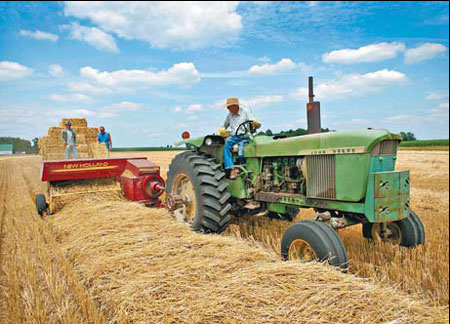China-US
Hedge fund farms reap from food doomsday warnings
Updated: 2011-08-11 07:47
By Seth Lubove (China Daily)
|
US farmers stack straw bales in Kirkland, Illinois. Investors are pouring into farmland in the United States and parts of Europe, Latin America and Africa as global food prices soar. Daniel Acker / Bloomberg |
LOS ANGELES - Perry Vieth baled hay on a neighbor's farm in Wisconsin for two summers during high school in 1972 and 1973. The grueling labor left him with no doubt about getting a college degree so that he'd never have to work as hard again. Thirty-eight years later, and after a career as a securities lawyer and fixed-income trader, Vieth is back on the farm.
Except, now, he owns it. As co-founder of investment company Ceres Partners LLC, Vieth oversees 61 farms valued at $63.3 million in Illinois, Indiana, Michigan and Tennessee. He's so enthusiastic about the investments that he quit a job in 2008 overseeing $7 billion in fixed-income assets to focus full time on farming, Bloomberg Markets magazine reports in its September issue.
"When I told people I was leaving to start an investment fund in farmland, they said, 'You're doing what?'" Vieth said. "It will always be difficult for Wall Street firms to understand. It's not like buying stocks on a computer."
It's much better: Returns from farmland have trounced those of equities. Ceres Partners produced an average annual gain of 16.4 percent after fees from January 2008, just after the firm started, through June of this year, Vieth said.
The bulk of the returns are in rent payments from tenant farmers who grow and sell the crops and from land appreciation. The Standard & Poor's GSCI Agriculture Index of eight raw materials gained 5.3 percent annually over the same period, and the S&P 500 Index dropped almost 1 percent.
Investors are pouring into farmland in the United States and parts of Europe, Latin America and Africa as global food prices soar. A fund controlled by George Soros, the billionaire hedge-fund manager, owns 23.4 percent of South American farmland venture Adecoagro SA.
"I have frequently told people that one of the best investments in the world will be farmland," said Jim Rogers, 68, chairman of Singapore-based Rogers Holdings, who predicted the start of the global commodities rally in 1996. "You've got to buy in a place where it rains, and you have to have a farmer who knows what he's doing. If you can do that, you will make a double whammy because the crops are becoming more valuable."
The growth in demand for food, spurred by the rising middle classes in China, India and other emerging markets, shows no signs of abating. Food prices in June, as measured by a United Nations index of 55 food commodities, were just slightly below their peak in February. The UN's Food and Agriculture Organization said in a June report that it expects food costs to remain high through 2012.
So many investors have rushed to capitalize on food prices in the past three years that they may be creating a farmland bubble. The Federal Reserve Bank of Kansas City, which covers Colorado, Kansas, Nebraska and other agricultural states, said in May that farmland prices had surged 20 percent in the first quarter compared with a year earlier.
Hedge-fund manager Stephen Diggle calls farming the ultimate safe haven. Diggle began buying farms with his own money in 2008 after Lehman Brothers Holdings Inc filed for bankruptcy in September of that year and the S&P 500 plunged 43 percent in the next six months. He purchased 3,237.5 hectares in Uruguay, three smaller plots in southern Illinois and a 32.37-hectare New Zealand kiwi-and-avocado orchard.
"We really thought all the investment banks would go under," Diggle said. "Everyone said, 'Buy gold.' But at the end of the day, you can't eat it. If everything else goes and I just have these farms, it makes me moderately wealthy."
Prosperous China
"You can see what a more prosperous China will consume," Diggle, 47, said. "It means more dairy, more meat - not just pork and chicken."
Investors find in farmland a respite from the cyclical price swings of the commodities market. Since 1970, there have been at least four price jumps of at least 100 percent that were followed by steep declines in the S&P agriculture commodities index. By contrast, the average value of an acre of farmland tracked by the US Department of Agriculture has been on a mostly steady climb from $737 in 1980 to $2,350 in 2011.
By about 2006, Vieth's concerns about the economy were mounting. Inflation was at a low, and the dollar had peaked as US debt and deficits soared. So he searched for an asset class that would benefit from a currency decline and rising prices. His research led him to farms, since a falling dollar boosts US crop exports.
As the dollar fell 24 percent against the euro from January 2006 through May 2008, Vieth started buying land as personal investments until the business grew too big for Vieth to manage during evenings and weekends. So, in late 2007, he founded Ceres.
"I was more convinced hard assets were where you wanted to be, and farmland was the best investment I could identify," Vieth said. By May 2011, he had collected 6,976 hectares, mostly in the Midwest.
Possible bubble
When Vieth wants land, he goes shopping. Armed with aerial and soil maps, he looks for farms with predictable rainfall, mineral-rich land and good drainage, avoiding land that slopes too much, which could lead to soil erosion.
Driving by a 136.4-hectare farm for sale by a bank, Vieth frowns at the slant of the land and the trees that line the perimeter. "Those trees will shade the corn and stunt growth," he said.
The farm-investing boom is making lots of people happy, but could it all end in tears? The Federal Deposit Insurance Corp (FDIC), which regulates banks that lend to farmers, has examined whether investors may be pumping up prices and creating the conditions for a crash like the one that devastated the market in the 1980s, resulting in the failure of 300 farm banks.
In March, then-FDIC Chairwoman Sheila Bair devoted a symposium to the topic in Washington with the participation of economists, bankers and agricultural experts. "If there is a bubble in farmland prices, I hope the bulk of any correction is borne by investors such as hedge funds and not by the banking industry," William Isaac, chairman of the FDIC during the farm banking bust, said during the event.
Vieth's farm funds are facing head winds in the coming months and years. A likely rise in interest rates will push up his acquisition costs and the value of the dollar, which in turn might hurt commodity exports. While the former trader keeps a close eye on the dollar, he says farming will continue to thrive.
Investors seem to agree. Vieth sits down at his computer one evening and totals the day's haul: another $900,000 from investors looking for comfort - and profits - in one of the oldest and most essential industries on the planet.
Bloomberg News

Specials

Star journalist leaves legacy
Li Xing, China Daily's assistant editor-in-chief and veteran columnist, died of a cerebral hemorrhage on Aug 7 in Washington DC, US.

Beer we go
Early numbers not so robust for Beijing's first international beer festival

Lifting the veil
Beijing's Palace Museum, also known as the Forbidden City, is steeped in history, dreams and tears, which are perfectly reflected in design.
